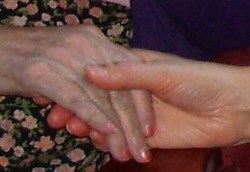
There was some discussion on Facebook this week after one of my cousins posted a quote: Everyone you meet is fighting a battle you know nothing about. Be Kind. Always.
The consensus was that it is easier said than done. After all, we're only human, not angels.
News-wise, this year continues with its heavy load of war, killing, beheadings, kidnappings, sexual abuse, dishonesty, etc, and sometimes it's tempting to think that the human race is sinking under the weight of its own wrongdoing, but I am also constantly reminded of the possibility of acts of love and kindness, however small.
I still remember a man, many years ago, who opened his door to ask if I was alright as I sat one night, howling with pain, on the steps of a church on Hastings' West Hill, having just learnt that my flat-mate was having a clandestine relationship with my then boyfriend, and had been for some time. His small act of kindness and consideration helped.
A friend, who spent some time in prison in her youth, had the words Love and Hate tattooed across the upper surface of her fingers. Every day we're given fresh opportunities to choose between those two things, and I feel sure that on some level, every single choice makes a difference.
I've referred before in my blog to Victor Gollancz's marvellous anthology A Year of Grace. Here is an account from that book of a Russian woman who manifestly chose love over hate, even to her last day:
Elizabeth Pilenko came from a wealthy land-owning family in the south of Russia. She went to the Women's University of St Petersburg and began at the age of eighteen, while still a student, to teach in the evening courses at the great Putilov factory. She published two books of poems and was a close friend of some of the best-known younger Russian poets.
She became a keen socialist revolutionary, and during the years 1914-1917 her life was taken up with revolutionary activities. After the October Revolution she worked with extraordinary skill and audacity in rescuing victims from the Terror. Later she became Mayor of her own home town, working for justice between the Whites and the Reds, both of whom had resorted to violence against their opponents. She was denounced as a Bolshevist, tried and acquitted.
In 1923 she came to Paris. The excesses of the Revolution as it developed revolted her, though she remained to her death a staunch advocate of its principles. She found her way back to religious faith largely under the influence of Serge Bulgakov, who had been a Marxist. She presented herself to the authorities of the Russian Church in Paris and announced that she wished to become a religious, "beginning at once, today," and to found a monastery. She had her way, but she was not the traditional Russian Orthodox religious. She was accused by some of neglecting the long services and the traditional contemplation. "I must go my way," she said. "I am for the suffering people". In the early morning she was at the markets buying cheap food for the people she fed, bringing it back in a sack on her back. She was a familiar figure in the slum, in her poor black habit and her worn-out men's shoes.
The many Russian refugees in France in those days were stateless persons, many of them poverty-stricken, without privilege, without claim on any of the services which the country provided for the poor. Mother Maria worked among the poorest. She discovered that Russians who contracted tuberculosis were lying in a filthy hovel on the banks of the Seine into which the Paris police used to throw those syphilitic wrecks which they picked up along the riverside. With ten francs in her pocket she bought a chateau and opened a sanatorium.
Then she found that there were hundreds of Russians in lunatic asylums all over Europe. They had just "disappeared" into these institutions, where no questions were asked about them. She raised a public outcry and got many of them released. In those days the Russian congregations in and around Paris were living examples of what the early apostolic communities must have been. They were real homes for the poor and the unwanted. Russians living in tenements could find there comfort and friendship. The Churches had their own labour exchanges, clinics and many other services, and the convent, over which Mother Maria presided, was central to their life.
When the German occupation took place Mother Maria summoned her chaplain and told him that she felt that her particular duty was to render all possible assistance to persecuted Jews. She knew that this would mean imprisonment and probably death, and she gave him the option of leaving. He refused. For a month the convent was a haven for Jews. Women and children were hidden within its walls. Money poured in to enable them to escape from France and hundreds were got away. At the end of a month the Gestapo came. Mother Maria was arrested and sent to the concentration camp at Ravensbruck. Her chaplain was sent to Buchenwald, where he died of starvation and overwork.
The story of her life in the camp is only now being pieced together. She was known even to the guards as "that wonderful Russian nun", and it is doubtful whether they had any intention of killing her. She had been there two and a half years when a new block of buildings was erected in the camp, and the prisoners were told that these were to be hot baths. A day came when a few dozen prisoners from the women's quarters were lined up outside the buildings. One girl became hysterical. Mother Maria, who had not been selected, came up to her. "Don't be frightened," she said. "Look, I shall take your turn," and in line with the rest, she passed through the doors. It was Good Friday, 1945.
CHRISTIAN NEWS LETTER, April 17th, 1946

 RSS Feed
RSS Feed
